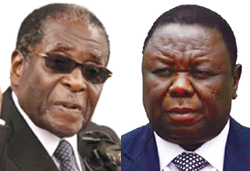


 WHEN Zimbabwe’s Supreme Court reserved judgment last week on an application to compel President Robert Mugabe to announce an election date before the current Seventh Parliament expires on June 29, it was not surprising.
WHEN Zimbabwe’s Supreme Court reserved judgment last week on an application to compel President Robert Mugabe to announce an election date before the current Seventh Parliament expires on June 29, it was not surprising.
Why? A constitutional crisis that is very likely at this point in time must be avoided at all costs as it has serious political and socio-economic ramifications.
Arriving at a date for the next election is as complex as the current transition the country finds itself in.
The young democracy is in the process of shedding off the old Constitution and assuming the new one which requires Parliament to implement certain provisions of the new supreme law while shelving others for much later.
Consequently, the Supreme Court cannot rush to compel President Mugabe because it has to be guided by clear reason that balances the transition dynamics.
President Mugabe has already said he has no intention to rule by decree when the Seventh Parliament dissolves on June 29.
But it is actually emerging that he might end up doing so if the transition from the old to the new Constitution is adhered to.
Besides, with President Mugabe’s own party appearing deeply divided, a June 29 election is increasingly now virtually impossible.
Therefore, if June 29 is ever to be the election date, the Supreme Court has until end of today to make a ruling on the case before it.
This is so, because section 158 of the new Constitution says: “A general election must be held so that polling takes place not more than — (a) 30 days before the expiry of the five-year period specified in section 143…”
So, ideally, according to constitutional experts, because Section 158 of the new Constitution, which deals with the election date, does not come into immediate effect but much later, the old constitution’s section 58 must apply.
Section 58 of the old Constitution states that: “A general election shall be held on such a day or days within a period not exceeding four months after the issue of a proclamation dissolving Parliament under section 63 (7) or, as the case may be, the dissolution of Parliament under Section 63 (4) as the President may, by proclamation in the Gazette, fix.”
Going by this section, elections could be held much later than June 29.
The fact that governing political parties in the Government of National Unity (GNU) are differing on the date(s) for the elections could trigger a constitutional crisis.
Web-based research engine Wikipedia defines a constitutional crisis as occurring “…because one or more parties to the dispute willfully choose(s) to violate a provision of a constitution or an unwritten constitutional convention, or it may occur when the disputants disagree over the interpretation of such a provision or convention. If the dispute arises because some aspect of the constitution is ambiguous or unclear, the ultimate resolution of the crisis often establishes a precedent for the future.”
Should President Mugabe decide to act unilaterally without consulting other principals in the GNU, then all hell will break loose.
In other words, if President Mugabe so decides before midnight today to declare a June 29 election without the date’s endorsement by the two Movement for Democratic Change (MDC) formations, a constitutional crisis would be in the offing.
With the MDC formations’ position, that elections should be held when all the reforms have been fully implemented, quite clearly then Zimbabwe is indeed navigating uncharted waters. What, however, seems clear is that there will not be any elections in June since the mandatory voter registration and education that starts next week will take at least 30 days.
But what would be suitable for each of the three political parties?
Hopewell Masola, a political analyst had this to say: “If I were a member of ZANU-PF, I would go for an early election which will take place in familiar conditions as prevailed during the 2008 harmonised elections.
“Those conditions as they apply presently, provide a natural playing field for ZANU-PF. The chaotic state of the voters’ roll, ZANU-PF’s control of all State machinery and the diamond income all give ZANU-PF a head start.”
“If I were a member of any of the MDCs, an early election would definitely portend a bleak political future for the country. A political future that is obscure for any country spells economic doom. If I were a businessman with huge investments in Zimbabwe, I would probably ask for an early election with the hope that a government that is more receptive to business concerns will win. The business world may be baying for an early election in order to sanitise the fiasco on indigenisation seeing that the current talk is all about electioneering. The business world wishes to end this misery as soon as possible,” said Masola.
He opined that the business community knows that when not faced with elections, ZANU-PF resorts to some degree of sanity, while ordinary Zimbabweans would be in favour of delayed elections to enable the enactment of electoral reforms.
“Electoral and security sector reforms do give ordinary people a hope for free and fair elections. Politically, late elections will dent President Mugabe’s ego to the point he will show signs of emotional stress. If the Southern African Development Community (SADC) manage to twist his arm into agreeing to late elections then his stature as a leader with clout will diminish significantly. Sadly (President) Mu-gabe knows that any procrastinations render him politically vulnerable,” added Masola.
Another political analyst, Love-more Fuyane says that not all reforms wished for by the MDCs would be implemented.
“To be brutally honest, I think what remains feasible within the remaining legal time frame is the alignment of relevant legislation to the new Constitution. It’s unlikely that some of the most contentious issues such as security and media sector reforms would see the light of day, at least not substantially. Equally so, I think it’s unlikely every single restrictive measure by the west would disappear. The two appear to be inextricably linked,” said Fuyane.
Fuyane thinks that many of these issues would most likely linger as possible exit clauses should an unfavorable outcome materialise for any party during the elections.
“Should ZANU-PF lose, you clearly stand the risk of them pulling out the ‘it’s the west and it’s sanctions and foreign interference’ card and equally so for the MDCs the lack of these reforms serving as the scapegoat, legitimate or not. These are issues the SADC will have to manage and manage very carefully. SADC must, for instance, put in place measures ensuring that there isn’t even a hint of suspicion that the armed forces somehow manipulated the process. Strict monitoring and transparency will thus be paramount,” added Fuyane.
Masola thinks that what is politically feasible depends on which side of the great political divide one comes from. From the reformists’ point of view, it is politically and economically feasible and viable to thoroughly prepare for free and fair elections.
“For the hegemonic preservatives (of the pre-GNU status quo) it appears inviting to rush into elections merely because the results can be manipulated to their advantage,” he said.